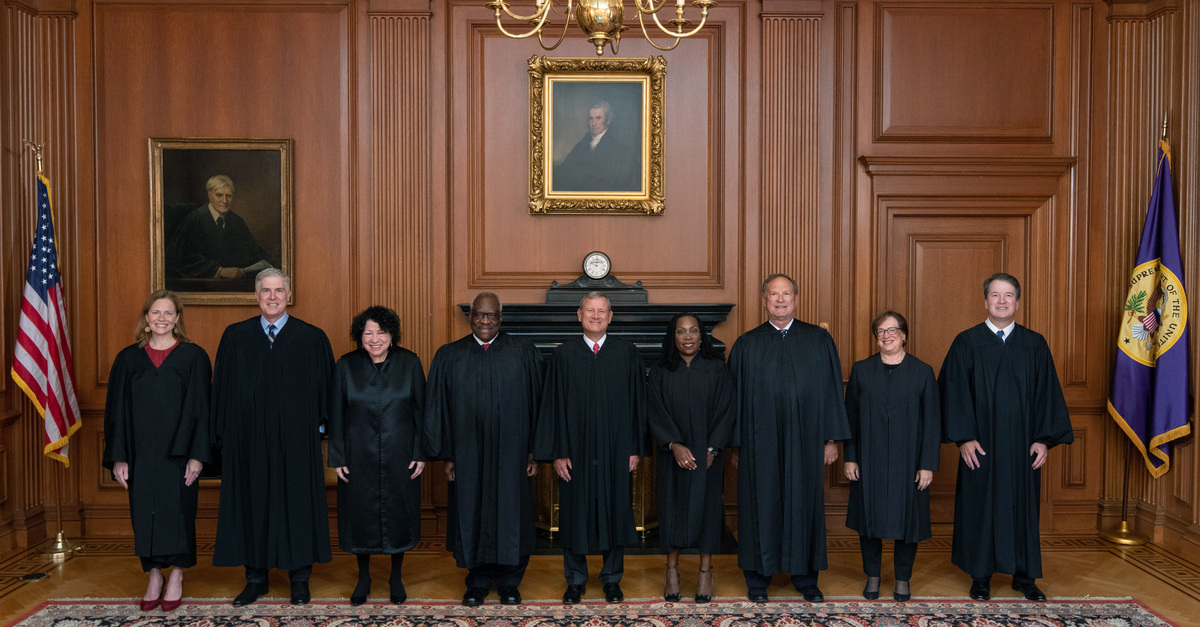
The Supreme Court of the United States. (L-R) Associate Justices Amy Coney Barrett, Neil M. Gorsuch, Sonia Sotomayor, and Clarence Thomas, Chief Justice John G. Roberts, Jr., and Associate Justices Ketanji Brown Jackson, Samuel A. Alito, Jr., Elena Kagan, and Brett M. Kavanaugh
The Supreme Court of the United States heard oral arguments Monday in a set of consolidated cases, in which 30 states allege Delaware had no right to keep funds from uncashed MoneyGram checks for itself.
The original jurisdiction case, Delaware v. Pennsylvania and Wisconsin and Delaware v. Arkansas et. al, is potentially worth hundreds of millions of dollars that ended up in the First State’s treasury after the unpaid funds were said to have “escheated” — or reverted.
Much of the controversy seems to have arisen as a result of somewhat dated language used in the applicable law. Under the 1974 Disposition of Abandoned Money Orders and Traveler’s Check Act, unclaimed funds that are “payable on a money order, traveler’s check, or other similar written instrument (other than a third party bank check)” go to the state in which the financial instrument was purchased. Any financial product that does not fall within the statute’s list is not subject to the rule; for those products, any unclaimed funds follow a separate set of rules for distribution, which usually means the money goes to the state in which the issuer is incorporated.
Joining Pennsylvania in the lawsuit are Alabama, Arizona, Arkansas, California, Colorado, Florida, Idaho, Indiana, Iowa, Kansas, Kentucky, Louisiana, Maryland, Michigan, Montana, Nebraska, Nevada, North Dakota, Ohio, Oklahoma, Oregon, South Carolina, Texas, Utah, Virginia, Washington, West Virginia, Wisconsin, and Wyoming.
The 30 states argue that Delaware had no authority to take the unclaimed MoneyGram funds, simply because the “official checks” involved are really a type of money order — or at least, constitute “similar written instruments” as those term were used when the statute was drafted in 1974.
Pennsylvania first filed the case against Delaware in federal district court in 2016, and the litigation was then joined by 29 other states. Because the litigation is a dispute among individual states, it presents the relatively rare case in which SCOTUS has original jurisdiction, and therefore may act as fact-finder.
SCOTUS appointed Senior U.S. Circuit Judge for the Second Circuit Judge Pierre N. Leval as a Special Master in the case. Leval’s May 2021 report found that Delaware was wrong to claim the uncashed MoneyGram checks for itself.
Former Acting Solicitor General of the United States Neal Katyal argued the case for Delaware. Katyal began by reminding the justices that for many years, even the states themselves agreed that the two financial instruments in question (MoneyGram “agent checks” and “tellers checks”) were indeed left out of the statute’s definition. Only after the states engaged “creative consultants” did they change their mind, said Katyal.
The justices appeared relaxed and jovial as they questioned Katyal and Arkansas Solicitor General Nicholas Bronni (who argued for the states) on the precise functions of the various financial instruments at issue, both in the early 1970s and today.
Katyal argued that the statute constituted Congress’ attempt to ensure that financial instruments for small dollar values would not incur unnecessary extra fees and urged the justices to create a bright line rule that would apply to similar disputes moving forward.
Justice Clarence Thomas asked Katyal to clarify the weight properly given to the label of a product. Katyal responded that given the importance of the label to consumers (for example, calling something a “money order” instead of a “check” would matter to both consumers and to banks), there is no relevant history to draw upon.
A key point at issue raised by several justices was whether all “money orders” require MoneyGram to record the name and address of the sender. Justice Neil Gorsuch pressed Katyal to define the statutory language, “other similar instruments.” Katyal explained that Congress had been concerned with nuances such as alternate spellings such as “travelers checques,” or the possibility of “Western Union” being used as a synonym for “money orders.” “I’m not familiar with other spellings of money order,” a skeptical Gorsuch remarked.
Justice Samuel Alito, Justice Sonia Sotomayor, and Justice Ketanji Brown Jackson asked Katyal a series of questions about the practical functioning of the MoneyGram checks at issue, including who signs the checks, which checks require the provision of personal information, and which characteristics are fundamental to the definition of the instruments.
Bronni argued for a broader definition of “money order,” and reminded the justices that the MoneyGram products sold today did not even exist at the time of the statute’s drafting.
Gorusch turned away from the characteristics of money orders and posed a more difficult question to Bronni: “If we did agree you then what happens next?” Gorsuch was referring to the remedy portion of the case before the Supreme Court.
Bronni said that because the proceedings have been bifurcated, the issue of a remedy has not yet been addressed. Bronni pointed out, however, that Delaware acknowledged in its brief that it might need to repay the money.
“Any time we’re dealing with unclaimed property,” said Bronni, “the state is holding it in trust.”
You can listen to the full oral arguments here.
[Photo by Collection of the Supreme Court of the United States via Getty Images]